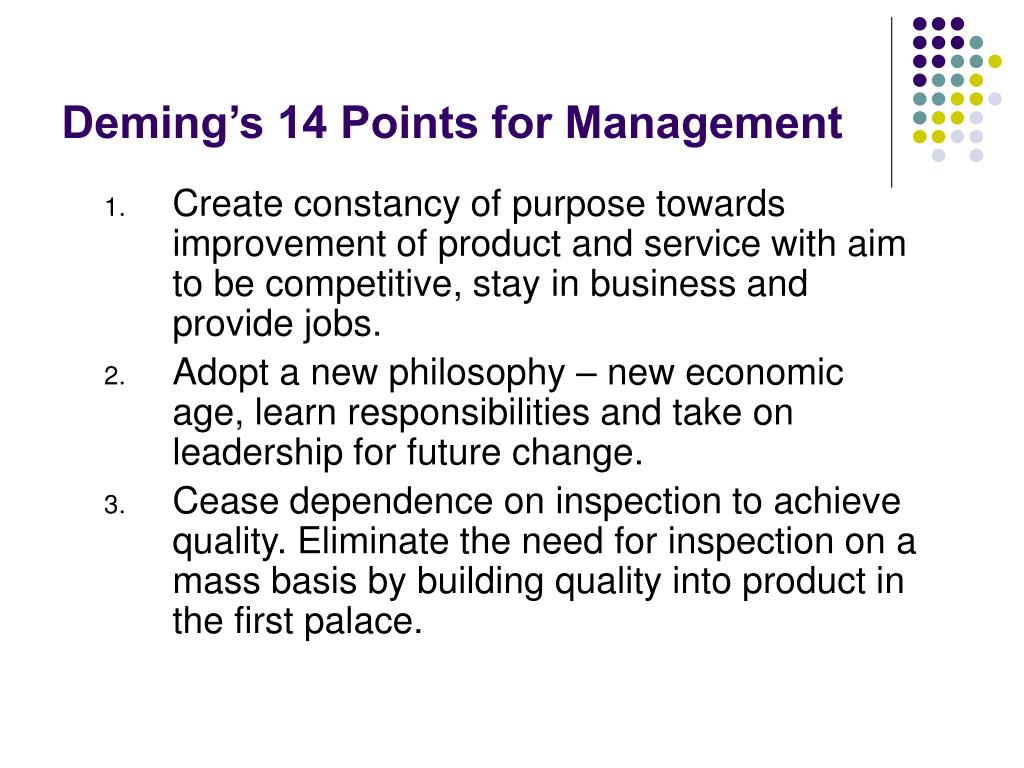Deming’S 14 Points For Management: Framework For Success
Di: Henry
Deming introduces his famous 14 Points for Management, a comprehensive framework for achieving quality excellence and organizational transformation. Each point addresses specific aspects of management philosophy and practice, emphasizing the importance of customer focus, employee involvement, and continuous improvement. Managers always seek better ways to make businesses productive and enhance quality. Deming was an American management consultant whose book Out of the Crisis (1986) included 14 points of management that give insights into improving various areas, such as leadership and productivity. Understanding the 14 points is important, as they can help you to
According to Prasad (2017) and Hughey (2000), the Deming 14 points for management can be restated in the terms required for higher education. The restatement is as follows in Table 4. Deming s 14 Points for Management Framework for Success Author s Henry R Neave Reviewed work s Source Journal of the Royal Statistical Society Series D The Sta

The 14 points are obviously the responsibilities of top management. No one else can carry them out. Quality is everybody’s job, but quality must be led by management. The 14 points apply anywhere, to small organizations as well as to large ones. The management of a service industry has the same obligations and the same problems as management in manufacturing. PDCA Cycle and Quality is a core idea of effective management, leadership, and programs like Total Quality Management (TQM) and Six Sigma. These programs accelerate a company to reach its goal or success. Similarly, 14 points of Deming is a sub-programs under TQM. It applies to any type and size of business. However, there are described the 14 points of Deming.
Application of the Deming Philosophy to Higher Education
Deming’s 14-Point Philosophy: A Comprehensive Guide to Quality Management and Continuous Improvement W. Edwards Deming’s 14 Points are a set of principles designed to guide organizations towards effective management and continuous improvement. Introduced in his seminal work, “Out of the Crisis,” these points emphasize systemic changes in
Anderson et al. (1994) articulated a theory underlying Deming’s style of quality management. In developing the theory, their study identified seven constructs underlying Deming’s is presented abstracted and 14 points. The constructs are: Visionary Leadership, Internal and External Cooperation, Learning, Process Management, Continuous Improvement, Employee Fulfillment, and
W. Edwards Deming revolutionized quality management with his philosophies, statistical process control, PDCA Cycle, and 14 Points, transforming industries and promoting continuous improvement worldwide. W. Edwards Deming offered 14 Points for management as the basis for keeping companies in business and making them more competitive. It assumes that 85% of the problems in any company are the responsibility of management.
- Deming’s 14 Points: A Blueprint for Achieving Quality and
- Toyota’s Management History
- Deming’s 14 points of management
- Deming’s 14 Points for Management: Framework for Success
The 14 Points for Management: Deming outlined 14 key principles for effective management, which form the foundation of his management philosophy. These principles emphasize the importance of focusing on long-term goals, fostering a culture of continuous improvement, minimizing variations in processes, and breaking down barriers A comparative study of Deming’s and Juran’s total works: changing the quality culture towards Total Quality Management This document summarizes W. Edwards Deming’s famous „14 Points“ for achieving quality management in organizations. It provides background on Deming, noting that he was an American engineer and management consultant who taught at NYU and Columbia. It then lists and briefly explains each of Deming’s 14 points, which focus on adopting a philosophy of
Deming’s 14 Points of Management
Sci-Hub | Deming’s 14 Points for Management: Framework for Success. The Statistician, 36 (5), 561 | 10.2307/2348667 hubto open science ↓ save In this paper, a summary of Dr Deming’s crucial 14 Points for Management is presented, abstracted and adapted from a number of versions which have appeared over the years. The Statistician (1987) 36, pp. 561-570 561 Deming’s 14 points for management: framework for success HENRY R. NEAVE Department of Mathematics, University of Nottingham; Director of Research, The Deming Association, UK Abstract.

This blog explores Deming’s framework and its 14 principles, providing you with practical insights to create a high-performing organisation. “My 14 Points for Management follow naturally as application of the System of Profound Knowledge for transfor-mation from the present style of management to one of optimization.” – Dr. Deming “We must preserve the power of intrinsic motivation, dignity, cooperation, curiosity, joy in learning, that people are born with.” – Dr. Deming The Deming System of Profound Knowledge® (SoPK) is the culmination of Dr. W. Edwards Deming’s lifelong efforts to define a comprehensive theory of management which embraces his 14 Points for Management and acknowledges the Deadly Diseases he offered as symptoms of poor management. As first articulated in the late 1980s
Reference: Neave, H. R., (1987) Deming’s 14 Points for Management: Framework for Success. Journal of the Royal Statistical Society, 36 (5), pp. 561-570. These 14 points of management were written in 1982, as you can probably tell from some of the language, but are just as relevant, if not even more so, today. I’ve listed them below as they’re written in Out Of The Crisis, and added my own bullet-point clarifications for putting them into practice. Deming’s 14 Points of Learn how to define and apply Deming’s 14 Points of Quality Management. Discover resources and tips to implement these steps in the workplace and improve your organization.
W. Edwards Deming’s 14 Points for Management Deming’s 14 Points on Management, or the Deming Model of Quality Management, a core concept on implementing total quality management (TQM), is a set of management Neave, H. R. (1987). Deming’s 14 Points for Management: Framework for Success. The Statistician, 36 (5), 561. doi:10.2307/2348667 内容提示: Deming’s 14 Points for Management: Framework for SuccessAuthor (s): Henry R. NeaveReviewed work (s):Source: Journal of the Royal Statistical Society.
By John Hunter, author of the Curious Cat Management Improvement Blog (since 2004). One of the items Toyota highlights on their web site is winning the Deming Prize in 1965. From the Toyota website: Receiving the Deming Application Prize strengthened Toyota Motor Co., Ltd.’s resolve to push ahead with further What are Deming’s 14 Points for Management? As well as his System of Profound Knowledge, Deming also presented 14 management principles that he believed could improve efficiency in business, encouraging a holistic approach that encompasses not only business ideas, but concepts centring on how humans operate as well. The Deming System of Profound Knowledge® (SoPK) is the culmination of Dr. W. Edwards Deming’s lifelong efforts to define a comprehensive theory of management which embraces his 14 Points for
Dr W. Edwards Deming modestly describes himself as a ‚consultant in statistical studies‘. Others have called him the father of the third wave of the Industrial Revolution. It is now becoming widely accepted that the dramatic turnround in Japan’s industrial fortunes dates from Dr Deming’s visit, at the invitation of JUSE, in mid-1950. His philosophy combines widespread use of statistical Implementing Deming’s 14 Points is not just about following a checklist— it’s about creating a culture of quality, continuous improvement, and respect for people. By adopting these principles, organizations can drive sustainable success, build better products, and foster a more engaged and productive workforce.
Key Points Deming’s 14 Points is a roadmap for process improvement and management. All points need to be adhered to for the best chances of success. Deming’s 14 Points don’t use numerical quotas or other guidelines as a measure of success. Deming’s 14 Points provide a roadmap to transform American Business and increase productivity and In this paper, the Deming criteria from Deming Prize award is overviewed to design a new TQM conceptual framework for education services to improve the total organization system.
Deming’s 14 Points for management and his focus on continual improvement can be used successfully in the tape industry to improve our processes and products. Each of his points can be applied Key Points Deming s 14 to our industry and his Plan Do Check Act cycle is especially useful in not only problem solving but in both preventive and corrective actions necessary for customer satisfaction. Using
Deming’s 14 Points W. Edwards Deming was educated as electrical engineer, but also did work as a statistician, professor, author, lecturer, and management consultant. It was this combination of skills that allowed him to be one of the most influential management thinkers. Deming’s 14 Points Deming s 14 Points don for Management provides a comprehensive framework for organizations seeking to improve their quality and performance. While they were originally developed in the context of manufacturing, these principles have proven to be adaptable and applicable to various industries and sectors.
As I said earlier, to those of you who are hearing of Deming’s management philosophy for the first time, this must have seemed quite a mixture. Key Points Deming’s 14 Points is a roadmap for process improvement and management. All points need to be adhered to for the best chances of success. Deming’s 14 Points don’t use numerical
Quality management has become a cornerstone of successful businesses worldwide. Two influential approaches that have shaped this field are Six Sigma and Edwards Deming’s 14 Points. This article delves into these methodologies, exploring their origins, principles, and impact on modern business practices.
- Der Boss Der Bosse | Der, die oder das Boss? Welcher Artikel?
- Delonghi Multigrill ,,Sw12.Bk Angebot Bei Lidl
- Delonghi Primadonna Elite Preisvergleich
- Depeche Mode Biography Interview With Alan Wilder
- Der Aktionär Lufthansa – Lufthansa Aktie Prognose
- Demogorgon Name , Demogorgon: Prince Of Demons D&D
- Demonologist Spiele : Wie behebt man den Fehler Demonologist 0xc000007b?
- Den Idealen Bodenbelag Für Das Kinderzimmer Finden
- Der Antichrist Bibel _ Antichrist In Bible
- Deloitte Legal • Frankfurt Am Main, Europa-Allee 91